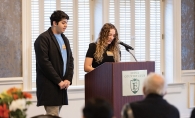It’s January and most college application deadlines have come and gone. But it’s a long time until May and many families of college-bound seniors live in a limbo of wondering, “How is this all going to play out?” For insight, we talked about college decision-making with a few Edina families with graduating seniors. They’ve done this dance before with an older child and have figured out some good steps. Given media hype about over-involved, helicopter parents, what we learned may surprise you.
Have empathy, for your kids and yourselves.
David Goldstein is on the Edina School Board. He and his wife Mary have three children–two are in college and one will graduate from Edina High School (EHS) in a few months. “[Choosing a college] is complicated and emotional,” Goldstein says. “It’s hard for everyone—parents and kids.” The most important thing for parents to do, according to Goldstein, is to stay focused on the child. Ask them, “What do you want out of life? What will make you happy? What colleges might best suit your individual needs?”
Some parents balk at these questions, says Goldstein, asserting that a child of 16 or 17 doesn’t have the experience to make these decisions. “They do,” Goldstein believes. He’s had exposure, he says, to European models of education in which children are entrusted with decisions like these from an early age. His family, for example, lets each child plan a college campus road trip. “Its value is in getting a kid excited about going to college.” However, don’t necessarily look for a “This is it!” moment when a child walks onto any given campus. Such a reaction is rare in Goldstein’s experience. He also suggests the purchase of an old-fashioned, hard copy book of college options (The Fiske Guide to Colleges, for example.) He’s found that a book held in hand is sometimes less intimidating, especially for an anxious student. It can be flipped through casually for very brief periods. “It may be that some kids just can’t get up the energy to go online.”
Let them do it.
Julie Swoap is a widowed mother of three girls. Her 20 year-old daughter Anja Beth attends Macalester College in St. Paul. Her two other daughters go to EHS. Swoap begins our conversation with a chuckle–Anja Beth apparently heard this reporter’s recorded telephone message, asking Swoap if she had any advice about how parents can best help their children in college planning. “Hah!” Anja Beth reportedly told her mother. “You didn’t help me at all!”
Swoap begs to differ. “I am the logistical planner,” she says, particularly regarding college campus road trips. It’s her job to help her kids get a feel for the kinds of schools out there: urban, rural, large, small. She advises her girls that they are going to get an education anywhere they go, so it’s wise to take stock of other students at the school. On one beautiful campus both Swoap and her daughter noted, entirely independently of each other, that the students seemed unhappy. Ask your kids, says Swoap, “Are these the kinds of people you want to spend the next four years with?” As for additional help in her daughters’ choice of college, Swoap is adamant, “This is their first adult decision. Let them do it.”
Expect initiative…
Joan White and husband Ed Cohen have a son (Will) at the University of Michigan, another (Luke) who is a senior at EHS and a daughter (Catherine), a junior at Holy Angels. White says her boys were very independent in their college searches and that each has always had an “I’ll do this myself” attitude. Assuming their children would take the initiative in making their own college plans has long been these parents’ expectation. However, White is quick to point out that “If a child isn’t taking the initiative, it’s a delicate balance. Some of their hesitation could be that they’re nervous because it’s a big decision, probably the biggest he or she has ever made.” Even her highly independent boys occasionally balked at some of the hoops college applications make kids jump through. “Sometimes they resisted writing yet another essay,” she says. When resistance arose, they talked it out–how, for example, a broader picture of an applicant might be seen in an essay than in just academic track record and test scores. And while “Will kind of knew” what he’d like to study in college, “Luke is less sure, although he’d like to play lacrosse,” White says. One thing that surprised her “was that if a college coach was interested in him, at least at the Division III level, that coach communicated directly with Luke. As a result, it’s important to keep the lines of communication open so we knew what was going on. If an offer came, it was our job as parents to help him determine if the school was a good fit; however, the decision was and is ultimately his.”
And be ready with the occasional “push.”
Krista Gresham’s son Andrew is a sophomore at Indiana University and her daughter, Leah, is a senior at EHS. “Andrew struggled for a long time even talking about college,” says Gresham. “He may not have wanted to give up high school.” At a low point in January of the year he graduated, Gresham demanded “he give me his top five college choices,” so that they could plan college visits and look at the financial picture. He ended up extending his applications from two to five schools. Like Luke Cohen with lacrosse, college touring for Andrew, who plays soccer, was often associated with sports tournaments. That’s also the case for Leah, who is a light-weight rower interested in engineering. An issue peculiar to her situation is a limited number of colleges offering both opportunities, with a preponderance of very academically challenging schools among them. Gresham says assisting Leah with her college search has been “more collaborative” than her experience with Andrew, but that, as with Luke Cohen, much of the sport-oriented strategy has been between Leah and her rowing coach.
What really matters?
A final observation of Goldstein’s comes from a college campus visit with one of his sons to a “good, but not Ivy League” school. “We listened to a student speak about some really amazing experiences she’d had at and through that college. When I came home, I realized how little it really matters where you go. What matters is what you do with it.”









